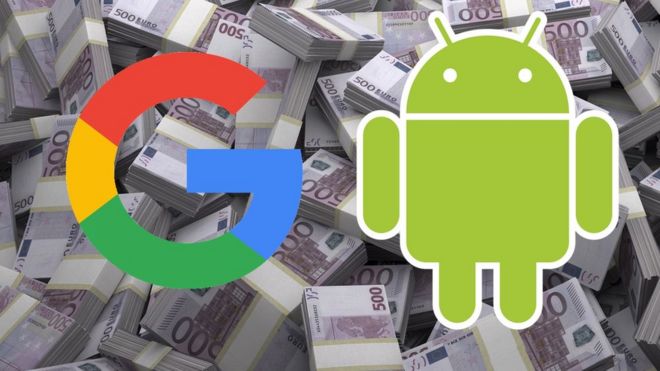Google charged for $5 billion by EU
On Wednesday, the European Union slapped a record 4.34 billion euro ($5 billion/£3.9billion) fine on Google for using its Android phone software to stifle competition.
The European Commission said the firm had used the mobile operating system to illegally "cement its dominant position" in search.
The firm's parent Alphabet has been given 90 days to change its business practices or face further penalties of up to 5% of its average global daily turnover.
EU antitrust regulators ruled that the company, whose Android software powers more than 80 percent of the world's smartphones, pushed consumers to its search engine, further weakening rival search providers and app makers.
"Google has used Android as a vehicle to cement the dominance of its search engine," Margrethe Vestager, the EU's competition commissioner, said in the decision. "These practices have denied rivals the chance to innovate and compete on the merits."
While Google plans to appeal the ruling, the decision as it stands could have wide implications for the company's advertising business, as well as for phone manufacturers and app developers.
What did Google do?
The EU has a fundamental problem with the agreements between Google and phone makers like Samsung over the use of Android.
Although Google offers the open source mobile software for free, the EU takes issue with the requirements placed on manufacturers to pre-install Google's search and Chrome browser apps if they want to license the Play app store. Google actually ties Play to a suite of 11 different apps, including Maps, Gmail and Docs, but the only ones that the EU has called for it to separate from Play are Chrome and Search.
The EU also says that it's illegal for Google to pay manufacturers and carriers to exclusively pre-install Google's search app on phones, which it says it did between 2011 and 2014, and to use so-called anti-fragmentation agreements to prevent phone makers from selling modified versions of Android.
What's Google's argument?
In a blog post on the ruling, Google CEO Sundar Pichai said that Android has increased competition, not diminished it.
Google's main rebuttal is that Android users can easily remove the pre-installed apps and download third-party alternatives. According to Pichai, a "typical Android user" installs 50 apps.
Pichai said that phone manufactures can also choose to modify Android, citing Amazon's line of Fire products (though he doesn't mention the EU's accusation that its agreements with phone makers kept other manufacturers from making phones with FireOS), and that Android has compatibility rules to ensure that app developers' products work across devices.
The European Commission said the firm had used the mobile operating system to illegally "cement its dominant position" in search.
The firm's parent Alphabet has been given 90 days to change its business practices or face further penalties of up to 5% of its average global daily turnover.
EU antitrust regulators ruled that the company, whose Android software powers more than 80 percent of the world's smartphones, pushed consumers to its search engine, further weakening rival search providers and app makers.
"Google has used Android as a vehicle to cement the dominance of its search engine," Margrethe Vestager, the EU's competition commissioner, said in the decision. "These practices have denied rivals the chance to innovate and compete on the merits."
While Google plans to appeal the ruling, the decision as it stands could have wide implications for the company's advertising business, as well as for phone manufacturers and app developers.
What did Google do?
The EU has a fundamental problem with the agreements between Google and phone makers like Samsung over the use of Android.
Although Google offers the open source mobile software for free, the EU takes issue with the requirements placed on manufacturers to pre-install Google's search and Chrome browser apps if they want to license the Play app store. Google actually ties Play to a suite of 11 different apps, including Maps, Gmail and Docs, but the only ones that the EU has called for it to separate from Play are Chrome and Search.
The EU also says that it's illegal for Google to pay manufacturers and carriers to exclusively pre-install Google's search app on phones, which it says it did between 2011 and 2014, and to use so-called anti-fragmentation agreements to prevent phone makers from selling modified versions of Android.
What's Google's argument?
In a blog post on the ruling, Google CEO Sundar Pichai said that Android has increased competition, not diminished it.
Google's main rebuttal is that Android users can easily remove the pre-installed apps and download third-party alternatives. According to Pichai, a "typical Android user" installs 50 apps.
Pichai said that phone manufactures can also choose to modify Android, citing Amazon's line of Fire products (though he doesn't mention the EU's accusation that its agreements with phone makers kept other manufacturers from making phones with FireOS), and that Android has compatibility rules to ensure that app developers' products work across devices.




![[Driver] HP LaserJet 1020,1022 Printer Series Driver direct download link](https://blogger.googleusercontent.com/img/b/R29vZ2xl/AVvXsEhAFP7aB0JcKIAAVQa4tN6-v9ETqbBmucVgCzEE112VY9FsOxlF0EgiCrYfAfnteDyw0LjvbqmWAmoQWfHhgMz0FEaMIO3wXHfGXbO0rgKAvZq6AYzrlgutkHByH0j8Ofs2cvylC3_Z0q8/s320/c02920588.png)